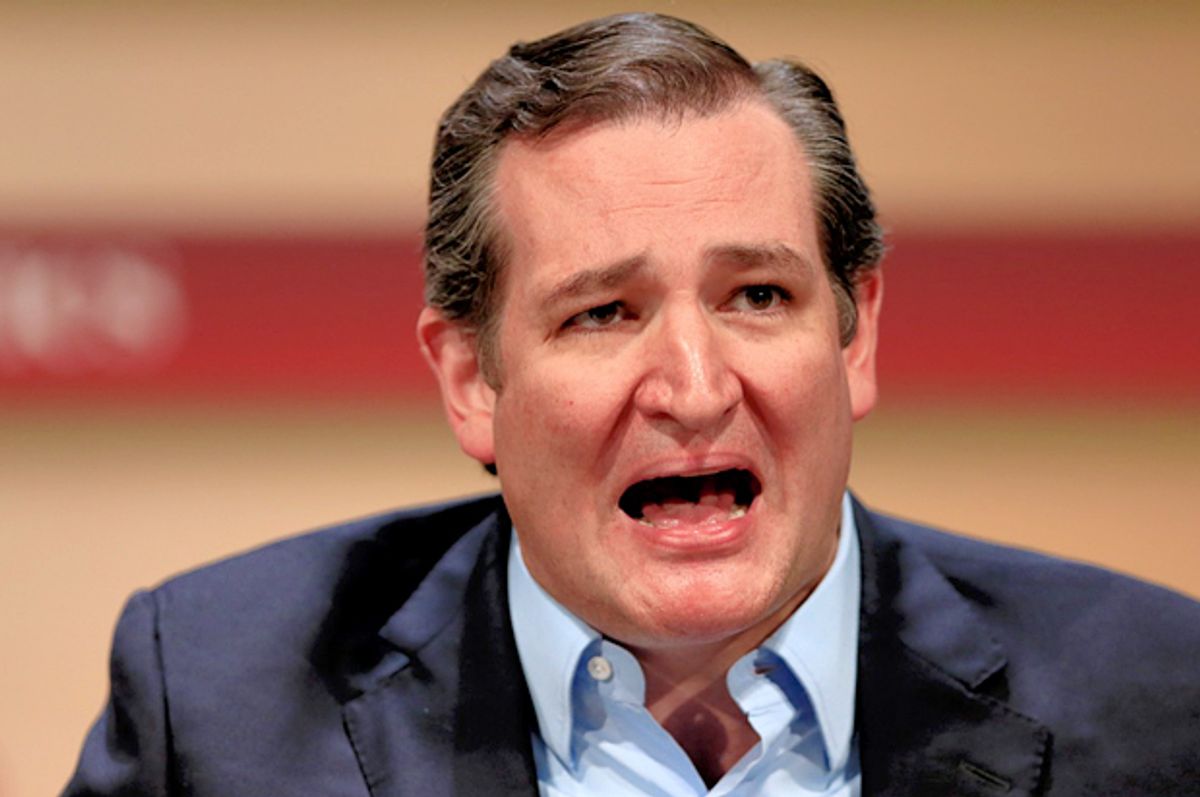About three-quarters of the Republican presidential candidates do not have any idea what they're doing. They got in the race, despite no chance of winning, and now they'll act likes dunces performing weird muppet stunts on cable news until their limited campaign and super PAC cash runs out.
Ted Cruz is not one of these candidates. He is the most consistently conservative candidate in the race, he has money, and he has a not-insane plan to capture the nomination. If this is the cycle where the old Republican rules go by the wayside, and the party establishment is unable to fend off a far-right challenger, it's a solid bet that Ted Cruz will be the candidate who upends that paradigm and puts his theory of recent Republican general election losses to the test.
Cruz's strategy begins with winning Iowa. We are quite familiar with his comical means of doing this: sucking up to Donald Trump so as not to offend his supporters, and then swooping in and seizing them if/when the Donald Trump fad subsides. If Cruz can win or even place second in Iowa, a lot of the other marginal "Iowa" candidates -- Santorum, Huckabee, Carson, Perry, Jindal -- would likely drop out in short order, and Cruz would be the obvious candidate to whom their supporters would gravitate.
From there it's a race to the South, as Politico reports today:
Cruz, who pulled in more money than any GOP candidate except for Jeb Bush so far, has spent the summer building out his staff and endorsement lists across the country, particularly in the South. He just spent seven days touring the region on a campaign bus in preparation for the March 1 SEC primary, when much of the region will vote, and rolled out a 186-person leadership team divided among states in the deeply conservative South, an adviser said.
Cruz would not be the first candidate in political history to try -- pardon the loaded term -- a "Southern strategy" for winning the nomination. The problem has typically been that by the time the Southern primaries roll around, the party establishment has already lined up behind a candidate and dedicated all of their resources to him.
But Ted Cruz is not at all hurting for resources, and it's hard to see him under any circumstances having to drop out of the race before primary season concludes. "It’s a bet that in the currently messy 17-person presidential field," Politico writes, "Cruz can emerge as the viable conservative alternative to the Republican establishment pick, and the two will duke it out from there."
It's a fine strategy. The looming problem for Cruz if he gets to that point is that the establishment candidate, backed by whatever remaining muscle the establishment still has, will bombard the airwaves with ads about how unelectable Cruz is in the general election. This typically works. Cruz's candidacy, though, is premised on the theory that moving to the middle ground in this polarized political environment de-energizes the Republican base from showing up on Election Day or for working to elect a candidate. If, against the din of everything the establishment throws at him, he is able to convince Republican primary voters that his theory is true or at least worth testing, he will have made modern political history.
When you watch Ted Cruz giving a speech or answering questions or participating in a debate, he's... insufferable, in my opinion, which counts for nothing in a Republican primary. But he's also a picture of total confidence. There is no doubt that he absolutely believes in everything he's saying, and he says it succinctly and without caveat. When you watch, say, Scott Walker or Jeb Bush answering any question, you can see the tense negotiations between competing political incentives going on in their heads. There are no such negotiations within Ted Cruz. It's compelling, if you're into that sort of thing.

Shares